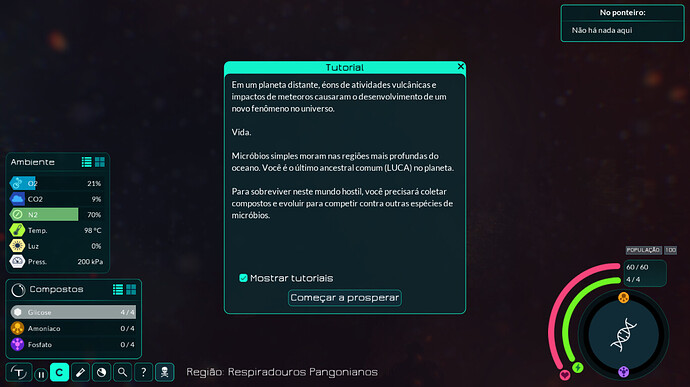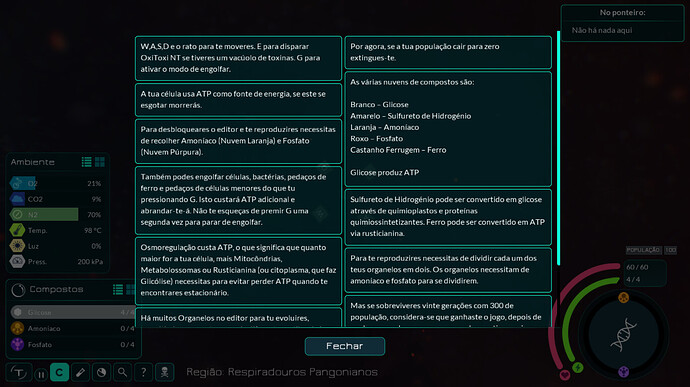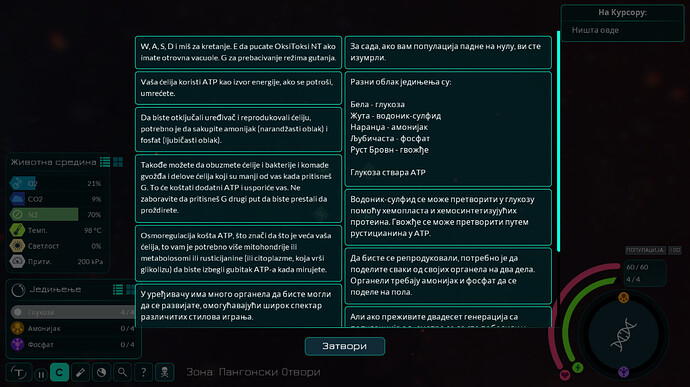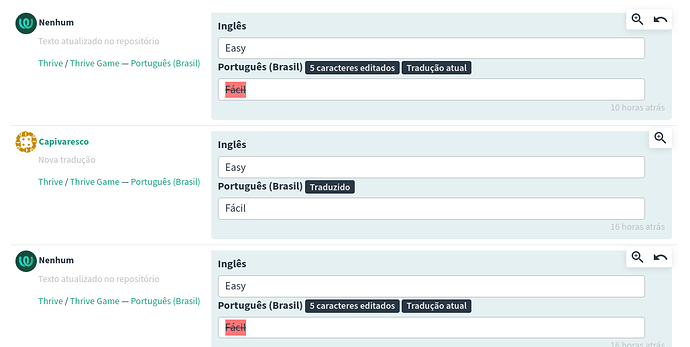It’s a bit difficult to tell without the msg ID or the context line numbers, but my guess is that the first one is the title of a popup box, and the second is the text content of the warning popup.
Is the string “went extinct” translatable? I couldn’t find it in Weblate
It’s currently not translatable, there’s an open issue on github for that https://github.com/Revolutionary-Games/Thrive/issues/1894. Hopefully it’ll be worked on soon.
Today I’ve started translating and a thought crossed through my mind. Will Thrive allow translations which no one will use, except maybe for laughs or learning, such as Klingon or Pig Latin? Maybe those translations would be put at the bottom of the drop-down menu for languages in its own section (not sure if it’s a drop-down menu, I haven’t played it in quite a while)
If the language is on the list of supported ones: https://docs.godotengine.org/en/stable/tutorials/i18n/locales.html
then it can be added, even if it is considered a joke language. The languages list is alphabetical based on the language codes. Any other order would be harder to make.
Is there a way to comment on a whole language translation? I noticed that the pt_PT translations uses the second person singular, rather than third person singular. That gives it quite an informal tone. It could IRL also be considered quite rude if one were to talk to a person that is a hierarchic superior; or not a child; or someone who is not a relative, nor a comrade, nor a friend. It may be a bit different on the internet. So I would like to debate on whether we should continue using the second person singular.
I wanted to do that myself on the latin translation to note that it isn’t possible to add it to the game yet, but I didn’t find such a feature. For now I suppose this thread is the best way. Iif someone who isn’t on these forums is taking part in translating, you could send them an email through the translations site to give them a heads up.
I noticed that, in the case of European Portuguese, if a string is missing, it fallbacks to Brazilian Portuguese. A lot of pt_PT translations from en are no different from pt_BR translations. Is it worth it to add a translation anyway?
Have you tested that in game? I haven’t seen / read anywhere that if a language variant is missing a translation it would use the translation from another variant. I think instead it will just default to English.
This doesn’t look like European Portuguese:
(«Você» isn’t normally used in pt_PT. And most strings are in Portuguese, despite pt_PT being quite incomplete at the moment.)
Could it be that despite it not saying anything anywhere, Godot does actually use the translations from a language variant?
@anon93453668 if that’s true, then that might explain:
Here’s also screenshot of the help screen, with pt_PT selected, which has been mostly translated to European Portuguese:
(One can see that it’s the European Portuguese translation, since it uses second person singular (tu, tua, te, etc…) and because they are listed as translated in the pt_PT translation project)
So I think it’s using the pt_BR translation for missing pt_PT strings.
And Serbian with latin character set seems to indeed fallback to Serbian with cyrillic:
Edit: I think a script could be written to replace all Cyrillic chars with Latin ones, with exceptions for some words that should remain the same, regardless of writing system.
Edit2: Huh, I mentioned someone in a comment, because he didn’t make his email public. And he made a change to some other string and didn’t react to the comment.
I think that my default Weblate has email notifications if you are mentioned in a comment.
If they are causing issues let me know, and I’ll try to contact them.
I might enable text reviews for all languages in Weblate, which makes it so that non-reviewer users can’t make changes to approved translations.
They are not causing issues. I just wanted to hear their view on a specific subject.
Should I translate the text inside BBCode (e.g. [thrive:compound type="glucose"]glicose[/thrive:compound])?
The wiki says I can’t, but the other languages did anyway.
The wiki is (once again) outdated. I removed the outdated info and added a small example.
So it is allowed to put translated content now within the compound specifying tags but it should only be used if the normal compound name would be grammatically incorrect or unwieldy in a sentence at that point.
Is the comma in the TIME_INDICATOR_TOOLTIP (Time Passed: {0:#,#} years) the character used to separate thousands? If it is, should I replace it with a point in my language?
I think it is not. It’s a C# formatting specifier which is automatically replaced based on the currently active language.
Edit: I just confirmed that it does what I expect. So formatting a string with {0:#,#} in Finnish locale results in output like 100 000 000. I’ll try to explain this on the translations wiki page.
Edit: I’ve updated the wiki page: Translation Guidelines - Thrive Developer Wiki
I assume “Nenhum” is Weblate or system. For some reason the translations are not sticking.
Once the change has been in weblate for a few days, it should get committed by weblate into the latest open translations PR, for example: Translations update from Thrive - Weblate by revolutionary-translation-bot · Pull Request #3449 · Revolutionary-Games/Thrive · GitHub
I just manually triggered a commit on weblate, so all latest changes from there should now be in that PR.



